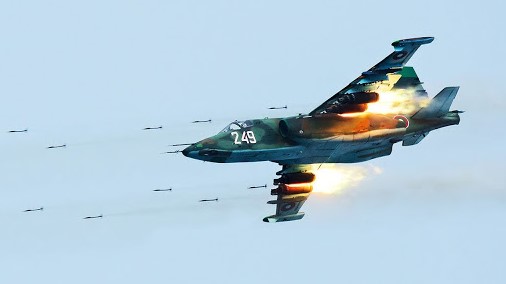To strengthen its air force against Moscow, Tbilisi is preparing to resume production of the Su-25 front-line bombers. The Israeli DTIB is said to have proposed westernizing them, as it did with the Mig-21s of Eastern European countries after the fall of the wall, to allow them to interact with NATO forces, but also to respond to the counterinsurgency market.
Annonce
Juansher Burchuladze, who is applying to become the next Georgian Defense Minister, said that the Tbilisi Aerospace Plant (TAM) will resume production of Su-25 within a fortnight. A project already mentioned in 2019 to meet the needs of the Georgian forces but also to address export markets. Used by 22 countries, the Su-25 is still the sixth most widely used aircraft in the world, with only 487 of them still in service. Let's not forget that it was two such aircraft that bombed the French military camp in Bouaké in 2004, with the help of a private military company that was also very active during the Georgian conflict. The Su-25 is a front-line bomber that remains today an extremely formidable aircraft in the context of counter-insurgency conflicts (Darfur, Ukraine, Syria...), and which for the Georgians could again find a buyer in Azerbaijan, Libya, Yemen, or Iraq. TAM, which was the largest producer of this aircraft after Sukhoi and even exported to Congo, would in fact seek to capitalize on its stock of 50 aircraft left unfinished with the end of the Soviet period. Moreover, TAM still has a real know-how to maintain and restore these aircraft. In the end, it could also seek to carry out the same type of operation on its stock of Mi-24 "gunship" helicopters.
Modernization
Russia cannot do without its 199 Su-25s, which still remain without a successor. Rustic and inexpensive to use, this other gunship has an incomparable cost/attention capacity ratio. Moscow has launched a vast modernization program to the SM-3 standard, to extend the life of its fleet by at least 10 years while offering new capabilities: self-protection with Ekran's Vitebsk suite, automatic target tracking by image recognition, expanded weapon range ... The latter is in fact just as well adapted to counter-guerrilla conflicts, as demonstrated every day by the operations carried out in Syria, as it is when faced with a technological adversary. The Ukraine has significant expertise with the ongoing modernization of 40 Su-25s by STC Progress (self-protection, digital sighting, flight recorder, etc.), but these would eventually be destined for resale following Kiev's plan to replace a large part of its air fleet with Western aircraft.
Israel
The whole problem for Tbilisi is to complete the construction of these 50 aircraft without the help of its Russian adversary, which has the production centers. While it will be able to find equipment and engines in the Ukraine for cannibalized aircraft, it will not be able to rely on Belarus, which is loyal to Moscow and whose 558th maintenance center in Baranovitchi is currently modernizing Bulgarian Su-25s. However, according to certain information, the Israelis, who are well established in Georgia and who heavily supported the country with equipment (drones, missiles) and military advisors during the 2008 conflict, have offered their assistance. In 2001, the company Elbit produced a modernized prototype, the Su-25 Scorpion or Su-25KM, equipped with modern avionics (multifunction screens, HUD, INS/GPS, digitization of the weapons system...). Above all, it is compatible with NATO standards (IFF), which Georgia is seeking to integrate. In addition, the Scorpion is not only capable of firing the R-73 short-range air-to-air missile, but above all Rafael's Lizard and Opher laser-guided bombs. The integration of IAI's universal bus would allow it to accommodate all modern Israeli sensors and associated weaponry. Thanks to TAM, the Scorpion, of which only one has been delivered to Turkmenistan, due to pressure from Moscow, could find a first export customer in Azerbaijan, then perhaps in the UAE. But Tbilisi would also have a formidable vector in case of conflict with Moscow.
Découvrez cet article sur Air&Cosmos

